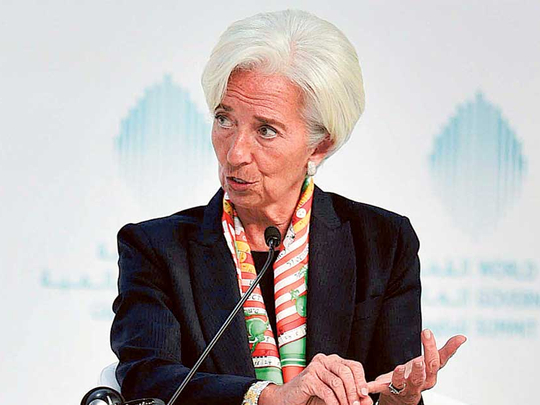
Dubai: If revenue reforms are to be successful and achieve their targets, policymakers will need to focus their tax policy on key priorities. In the oil-exporting countries, this means diversifying the sources of revenue away from oil and gas, said Christine Lagarde, IMF Managing Director speaking at the Second Arab Fiscal Forum in Dubai.
As a first step, countries are introducing a value added tax (VAT) and other consumption taxes — for example on tobacco and sugar-sweetened beverages. Over time, governments may also consider deriving additional revenue from income and property taxation.
GCC countries are working to introduce a harmonised VAT in 2018. The IMF expects these efforts could raise anywhere from 1 to 2 per cent of GDP, assuming a VAT rate of 5 per cent.
“Our experiences in other regions underscore the positive impact of [revenue] diversification. Mexico, for example, was able to boost its non-oil tax revenue by more than 3 per cent of GDP — by broadening the VAT base and raising energy taxes and personal income tax rates,” said Lagarde.
In the oil-importing countries the key priority is to generate higher revenue by broadening the base of existing taxes. Such reforms would make tax systems simpler, more efficient, and more equitable.
This requires rationalising multiple VAT rates and other tax preferences. Some of the key measures here include simplifying the rate structure and getting rid of exemptions, tax holidays and other carve-outs that benefit only a few and create opportunities for arbitrage. Tax reform also means making tax systems more progressive — by lifting the top marginal tax rate on personal income.
Transparency
More broadly, fiscal transparency and the sharing of reliable data are essential because e they increase the accountability of governments and because they can boost the resilience of their economies — and that includes lower borrowing costs, the IMF chief said.
New IMF staff research shows that greater data transparency leads to a 15 per cent reduction in the spreads on emerging market sovereign bonds.
Revenue reforms
The IMF chief called for interlinking tax policy reform with revenue administration reform.
“This coordinated, simultaneous effort can help countries avoid some of the time-consuming troubles of the past. Traditionally, policymakers would often start with new tax policies and worry about administrative capacity later. By interlinking the two elements right away, countries can “leapfrog” to a more advanced development stage,” said Lagarde.
This can be achieved by boosting the capacity of tax administration early in the reform process. To achieve a more sustainable and more inclusive economy, the region’s efforts to build tax capacity are vital to achieving that goal. “This means — above all — forging a comprehensive strategy that interlinks tax policy reform and administration reform to generate higher and more reliable revenue. That will make public finances more resilient and build economies that work of all citizens — here in this region and across the world,” the IMF chief said.
Factbox: Global growth to pick pace this year and next: IMF
After many years of feeble growth, the IMF is expecting global economic activity to pick up this year and next, and across both the advanced and emerging economies, said Christine Lagarde, IMF Managing Director speaking at the Second Arab Fiscal Forum in Dubai.
The IMF has projected 3.4 per cent growth for the global economy this year and 3.6 per cent for 2018.
“This does not mean we are out of the woods: conflicts and lower oil prices will continue to affect growth and, by extension, also government revenue. While oil prices have increased recently, we do not expect them to return to levels we have seen before 2014. And there are, of course, questions about geopolitical developments in many regions of the world,” said Lagarde.













